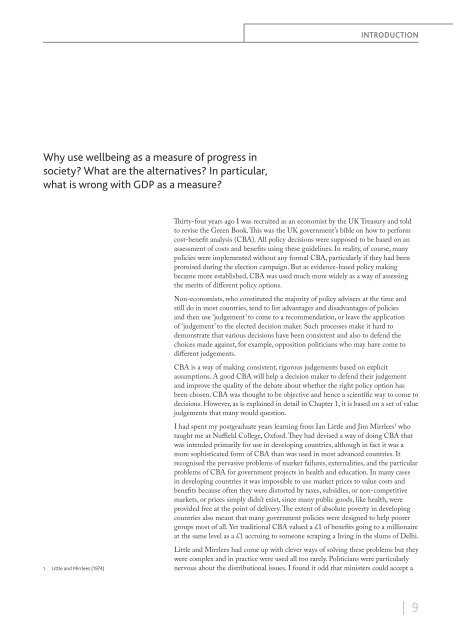commission-on-wellbeing-and-policy-report---march-2014-pdf
commission-on-wellbeing-and-policy-report---march-2014-pdf
commission-on-wellbeing-and-policy-report---march-2014-pdf
Create successful ePaper yourself
Turn your PDF publications into a flip-book with our unique Google optimized e-Paper software.
INTRODUCTION<br />
Why use <strong>wellbeing</strong> as a measure of progress in<br />
society What are the alternatives In particular,<br />
what is wr<strong>on</strong>g with GDP as a measure<br />
Thirty-four years ago I was recruited as an ec<strong>on</strong>omist by the UK Treasury <strong>and</strong> told<br />
to revise the Green Book. This was the UK government’s bible <strong>on</strong> how to perform<br />
cost-benefit analysis (CBA). All <strong>policy</strong> decisi<strong>on</strong>s were supposed to be based <strong>on</strong> an<br />
assessment of costs <strong>and</strong> benefits using these guidelines. In reality, of course, many<br />
policies were implemented without any formal CBA, particularly if they had been<br />
promised during the electi<strong>on</strong> campaign. But as evidence-based <strong>policy</strong> making<br />
became more established, CBA was used much more widely as a way of assessing<br />
the merits of different <strong>policy</strong> opti<strong>on</strong>s.<br />
N<strong>on</strong>-ec<strong>on</strong>omists, who c<strong>on</strong>stituted the majority of <strong>policy</strong> advisers at the time <strong>and</strong><br />
still do in most countries, tend to list advantages <strong>and</strong> disadvantages of policies<br />
<strong>and</strong> then use ‘judgement’ to come to a recommendati<strong>on</strong>, or leave the applicati<strong>on</strong><br />
of ‘judgement’ to the elected decisi<strong>on</strong> maker. Such processes make it hard to<br />
dem<strong>on</strong>strate that various decisi<strong>on</strong>s have been c<strong>on</strong>sistent <strong>and</strong> also to defend the<br />
choices made against, for example, oppositi<strong>on</strong> politicians who may have come to<br />
different judgements.<br />
CBA is a way of making c<strong>on</strong>sistent, rigorous judgements based <strong>on</strong> explicit<br />
assumpti<strong>on</strong>s. A good CBA will help a decisi<strong>on</strong> maker to defend their judgement<br />
<strong>and</strong> improve the quality of the debate about whether the right <strong>policy</strong> opti<strong>on</strong> has<br />
been chosen. CBA was thought to be objective <strong>and</strong> hence a scientific way to come to<br />
decisi<strong>on</strong>s. However, as is explained in detail in Chapter 1, it is based <strong>on</strong> a set of value<br />
judgements that many would questi<strong>on</strong>.<br />
I had spent my postgraduate years learning from Ian Little <strong>and</strong> Jim Mirrlees 1 who<br />
taught me at Nuffield College, Oxford. They had devised a way of doing CBA that<br />
was intended primarily for use in developing countries, although in fact it was a<br />
more sophisticated form of CBA than was used in most advanced countries. It<br />
recognised the pervasive problems of market failures, externalities, <strong>and</strong> the particular<br />
problems of CBA for government projects in health <strong>and</strong> educati<strong>on</strong>. In many cases<br />
in developing countries it was impossible to use market prices to value costs <strong>and</strong><br />
benefits because often they were distorted by taxes, subsidies, or n<strong>on</strong>-competitive<br />
markets, or prices simply didn’t exist, since many public goods, like health, were<br />
provided free at the point of delivery. The extent of absolute poverty in developing<br />
countries also meant that many government policies were designed to help poorer<br />
groups most of all. Yet traditi<strong>on</strong>al CBA valued a £1 of benefits going to a milli<strong>on</strong>aire<br />
at the same level as a £1 accruing to some<strong>on</strong>e scraping a living in the slums of Delhi.<br />
1. Little <strong>and</strong> Mirrlees (1974)<br />
Little <strong>and</strong> Mirrlees had come up with clever ways of solving these problems but they<br />
were complex <strong>and</strong> in practice were used all too rarely. Politicians were particularly<br />
nervous about the distributi<strong>on</strong>al issues. I found it odd that ministers could accept a<br />
| 9



